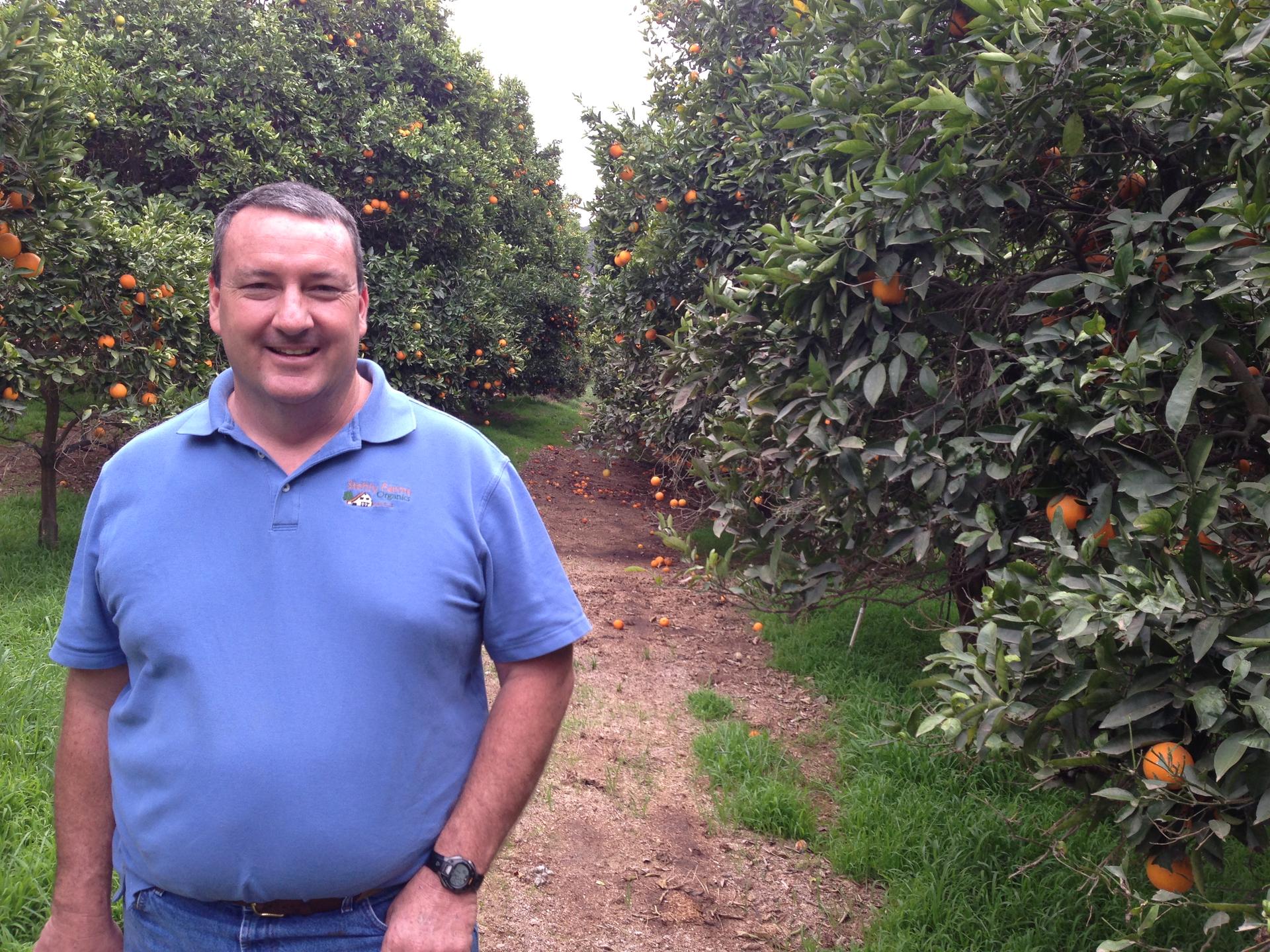U.S. agricultural industry hopes immigration reform fixes worker predicament
Noel Stehly, an organic farmer near San Diego, said he’s never tried to employ seasonal guest workers because the process is too cumbersome. (Photo by Adrian Florido/Fronteras.)
Noel Stehly’s organic farm is at the end of a winding country road just north of San Diego.
It’s a 200-acre farm, but orange and avocado crops only fill about half of it. The rest is empty.
“I’ve had to cut back on what I plant in my fields,” Stehly said. “I decided not to harvest some things because I couldn’t get the labor to do it.”
It is a long-standing complaint among farmers. The economy and tough immigration enforcement have sapped the local workforce. In theory, this shouldn't be a problem. A federal guest worker program called H-2A allows Stehly, or any U.S. farmer, to bring in as many temporary foreign workers as they need.
But Stehly laughs when asked why he hasn’t used the program.
“I’m not doing it,” he said.
Eric Larson, head of the San Diego County Farm Bureau, doesn’t blame him.
“Sure, the H-2A program says go ahead and bring farm workers in, but the H-2A program doesn’t work,” he said.
To participate, farmers have to prove to the U.S. Labor Department that they have tried to hire American workers but could not. They must transport guest workers from their home country, often Mexico, and provide housing and three meals a day. They must also show that their guest workers will not drag down local wages.
All this means lots of money, paperwork and, often, attorneys.
“Consequently, nobody uses it,” Larson said. “I think we’ve got one farmer in San Diego County that uses the H-2A for about eight workers, where in reality we have 10,000 to 12,000 farm workers in San Diego County.”
Larson said those thousands of workers are a mix of laborers without papers and aging legal workers, neither ideal for farm owners.
Across the U.S., farmers recruit an estimated 55,000 H-2A workers each year. But they are mostly in Florida and the Midwest, because California strictly enforces the H-2A program’s rules. Now, as immigration reform takes shape, the farm lobby wants to make hiring these workers easier. What Larson, the farm bureau director, wants, is simple: A card that would let workers, mostly from Mexico, cross the border when needed and return home when the season is over.
But labor and immigrant rights groups say that an open-door guest worker program could hurt workers.
One farm worker, who requested anonymity because he worried that speaking out might risk his tomato-picking job, said he came to California illegally in 1973 and became a citizen when Ronald Reagan signed an amnesty bill.
For years, he has picked tomatoes alongside seasonal H-2A workers.
He said he was told to keep up with the young guest workers, who pick fruit faster and work long hours. Older workers like him, he said, face significant pressure to keep up and worry about getting replaced.
“It’s impossible,” he said.
Cynthia Rice is an attorney for California Rural Legal Assistance, which provides legal aid to farm workers. She said this worker’s story highlights the threat H-2A poses both to guest workers and U.S. farm workers.
“The H-2A program still creates a second class of workers, specifically in agriculture,” Rice said.
She said H-2A guest workers can't switch employers, even if those employers impose grueling production standards. Workers have to either stick it out or they can go home.
“The H-2A worker can’t really vote with his feet,” Rice said.
These concerns are driving some immigrant advocates to oppose any guest-worker program. They say labor is available and their focus is on legalization for the millions of undocumented people already in the U.S., hoping they’ll fill these jobs and possibly demand higher wages.
But the farming industry is pushing for the freedom to bring in temporary, low-cost labor. Both President Barack Obama and Congressional Republicans lawmakers recognize that need, which is why some advocates are hoping to at least get stronger labor rights for all workers.
Stehly, the citrus and avocado farmer, said his needs are clear: His farm requires more workers, and the proof is in his empty fields. He recalled what one of his employees said years back.
“He said, ‘How can we amass X amount of hundreds of thousands of troops at the border of Kuwait in a matter of a week, but we can’t put a gate at the border that says, I got a job, you got a worker?’” he recalled.
At the same time, the tomato-picking farm worker said he would like all workers to have more rights and less fear and said another amnesty would help. This year may determine whether both men see their wishes realized.
Adrian Florido is a reporter with Fronteras: Changing America Desk, a public radio collaboration in the southwest focusing on the border and immigration issues.
